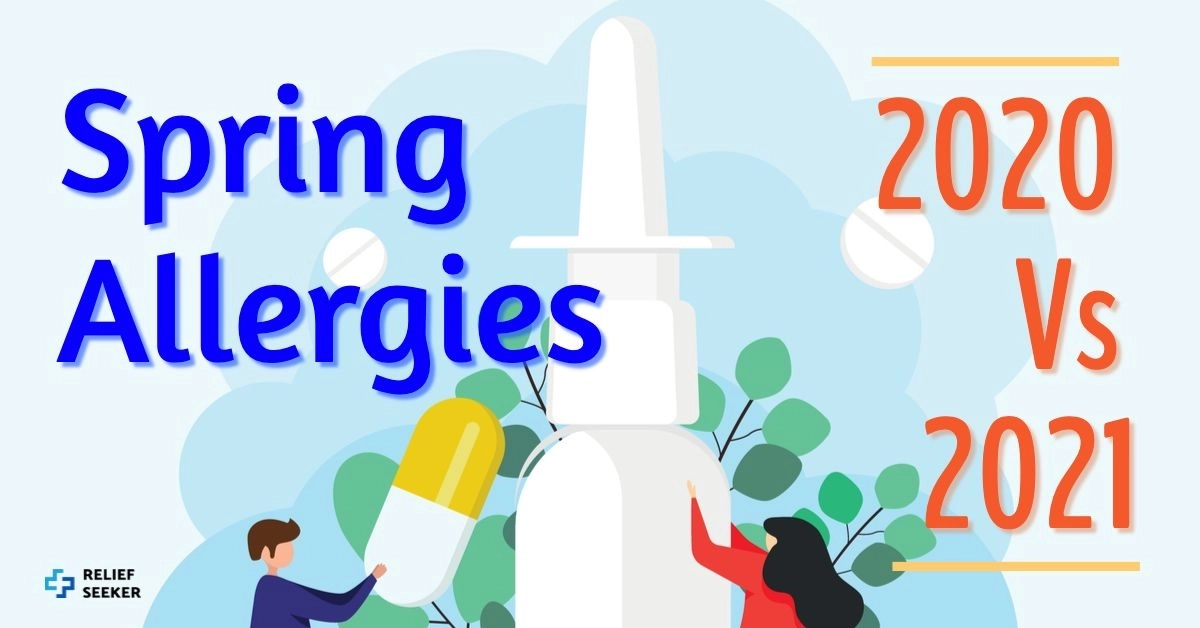Pollen allergies seem to worsen with each year — and this year is no exception. With the passing of each season, spring starts earlier and earlier, and pollen levels generally rise.
The good news is that there are steps we can take to minimize seasonal allergies and even prevent severe allergy symptoms altogether.
Discover the difference between spring allergies 2020 versus 2021 and how you can prevent and treat uncomfortable symptoms, such as sneezing, itching, and inflammation.
What Causes Spring Allergies?
Spring allergies (also referred to as allergic rhinitis and hay fever) are caused by excessive pollen levels. In the spring, the plants, trees, and flowers start to bloom and spread their pollen.
This pollen not only spreads across the ground, but it also becomes airborne and can enter our bodies through our skin, eyes, and respiratory systems. Tree pollen is the cause of most serious seasonal allergies in the spring, but the most common spring allergens may also include:
Ragweed
Grass pollen
Weed pollen
Tree pollen
Spring allergy symptoms may include a runny nose, itchy eyes and nose, sneezing, coughing, and congestion.
There’s also the added fear of the novel coronavirus in 2020 and 2021; allergy and COVID-19 symptoms are very common, so it may be difficult to distinguish between the two without a negative COVID test.
Why Are My Allergies Worse in Some Years?
Allergy symptoms can worsen during some years and not as prevalent during others. What generally matters most when predicting allergy symptom severity is pollen levels. When pollen levels are high, allergy symptoms are more likely to worsen. A few other factors may lead to increased allergy symptoms, including weather conditions, seasonal creep, and climate change.
Weather Conditions
Weather conditions can greatly impact the severity of allergy symptoms.
Generally, dry seasons and windy weather may lead to worsening symptoms. Rain can help to wash the pollen away, and pollen levels generally drop after large rainstorms. Windy weather can blow pollen around in the air, and pollen will generally land on outdoor furniture as well as on your clothes and skin, and in your eyes. Humid weather can ‘hold’ pollen and trap it in the air, too.
One way to determine if pollen levels are high is to simply check a weather site or app — both usually post current pollen levels.
Seasonal Creep/Global Warming
Seasonal creep is a phenomenon that causes spring to arrive early and autumn to last longer. As global warming and climate change worsen, winters are becoming (overall) less severe and lasting for shorter time periods; similarly, summers are lasting longer and are hotter than ever.
Pollen season will arrive earlier with earlier springs and worsen if the winter weather isn’t cold enough.
Previous Year’s Weather Conditions
If we get a hot and dry summer, we’re more likely to experience fewer seasonal allergies the following year.
When summers are hot and dry, pollen can die off; when the reverse happens, pollen can more easily populate.
Spring Allergies 2020 Vs 2021
The 2020 allergy season was slated to be, “One of the worst we’ve ever had.” So how do allergy conditions stack up between 2020 and 2021?
We’re sorry to report that allergy season in 2021 is probably going to be even worse than it was last year. And with risk factors (such as global warming and seasonal creep) only worsening each year, most experts don’t expect that we’ll get a reprieve from allergy symptoms any time within the next few years.
Of course, there are some other factors that come into play when predicting seasonal allergies, including the weather throughout the previous year’s summer, fall, and winter.
2021 Spring Allergies Risk Factors
One of the main reasons experts are predicting a rough spring for allergy sufferers is the predicted weather this season.
Meteorologists anticipate spring 2021 will be warm and dry — two conditions that can lead to lots of loose pollen in the air and an increase in allergy symptoms.
Most of us are allergic to pollen that floats through the air during the spring. Pollen can get stuck in our hair as well as on our clothing and skin. It can even float into our eyes when spring pollen counts are high.
Rain tends to wash away the pollen, which is why pollen counts are lower the day after heavy rain.
When Is Allergy Season 2021?
Allergy season 2021 has already begun in some areas of the U.S. In the South, residents are already complaining about allergy symptoms; some sufferers are also feeling allergy season early in the Northeast.
When temperatures start to rise, the plants, trees, and flowers will begin to bloom, kicking off pollination season. Since we’ve already experienced some warmer weather across the Eastern Seaboard, many plants are already blooming.
Many Americans are already experiencing itchy eyes, coughing, and sneezing.
2021 will be especially problematic for anyone suffering from tree allergies, as tree pollen counts are expected to be extremely high this year. Weed and grass allergy symptoms are also expected to be higher than usual.
Allergy Capitals 2021
Each year, the Asthma and Allergy Foundation of America posts its list of Allergy Capitals (™). In 2021, the 10 worst allergy hotspots include:
Scranton, Pennsylvania
Richmond, Virginia
Wichita, Kansas
McAllen, Texas
Pittsburgh, Pennsylvania
Hartford, Connecticut
Springfield, Massachusetts
New Haven, Connecticut
Oklahoma City, Oklahoma
Bridgeport, Connecticut
Treating Spring Allergies
The good news is that there are plenty of treatment options for seasonal allergies.
When to Start Treating Spring Allergies
If you suffer from severe spring allergies, you probably should have started treatment a month or two ago. If you’re not already taking an oral antihistamine or nasal spray, you’ll want to start treatment immediately.
Most allergy treatments take at least 45-to-60 days to start building up a resistance to allergens, and most patients don’t start taking allergy medications until symptoms start.
If you don’t treat your allergies until your symptoms start, you may be suffering more than you actually need to. Instead of treating your symptoms, you’ll want to start treating their cause. Talk to your doctor or online allergist to find out when to start taking your allergy meds.
OTC or Prescription Allergy Treatments?
These treatments are available both over the counter (OTC) and through personalized prescriptions. While OTC medications may seem less expensive than personalized prescriptions, this is simply not the case.
The main downside to buying OTC allergy medication is that you’ll get the same dose as everyone else, meaning you’ll probably end up with too little or too much of an active ingredient.
Both antihistamines and steroid sprays are available by prescription. Allergists and doctors at online digital clinics such as Picnic provide personalized prescriptions — all via telehealth platforms.
Get a consultation with a doctor, chat about your symptoms and medical history, and get your prescription delivered right to your door. Digital clinic doctors can also provide personalized instructions, including when to start allergy treatments and what time of day to take medications.
Spring Allergy Treatment Options
There are four main treatment options for spring allergies, including oral antihistamines, nasal sprays (antihistamine and steroid-based), eye drops, and immunotherapy.
Oral Antihistamines
The most commonly prescribed allergy medications are oral antihistamines and antihistamine-based nasal sprays.
Antihistamines simply block the histamines produced by your body to ‘fight off’ allergens.
Antihistamines are usually taken in pill form, once a day (brand names such as Claritin and Zyrtec are common oral antihistamines). Most of these medications are non-drowsy and fight allergens for up to 24 hours.
If you take too much of an antihistamine, you may experience uncomfortable side effects; if you take too little of this type of medication, you may still experience allergy symptoms.
Nasal Sprays
Nasal sprays work similarly to oral antihistamines; most nasal sprays contain antihistamines, and most are designed to combat nasal allergy symptoms specifically. Some nasal sprays also target eye allergy symptoms, too.
The brand-name nasal spray Flonase is a popular option, both over the counter and by prescription.
Another class of nasal sprays contains steroids to help fight inflammation, itching, and redness. Steroid-based nasal sprays are available by prescription only and should only be used under doctor or allergist supervision.
Eye Drops
Eye drops are designed to combat eye symptoms but may also address other related symptoms, too.
Most prescription or medicated eye drops contain antihistamines that reduce itching, redness, and inflammation.
Saline eye drops are also often sold by allergists, over-the-counter big-box retailers, pharmacies, and department stores. While they don’t prevent allergy symptoms, they do offer some relief from dry, itchy eyes — especially for patients that can’t take antihistamines or steroids.
Immunotherapy
Immunotherapy treats the source of the allergy, not just the symptoms.
Similar to a vaccine, immunotherapy introduces a small amount of the irritant into the system; the body slowly recognizes the irritant (in this case, the allergen) and starts to build an immunity against it. Eventually, the immune system will no longer see allergens as a threat.
This treatment is available in allergy shot or drop form. Shots must be administered at a doctor’s office, while drops can be shipped to your home or office.
The main downsides to immunotherapy are costs and time associated with treatment.
Treatment times start at one year and go up to five years total; costs vary between $1,000 and $5,000 for the entirety of the treatment.


